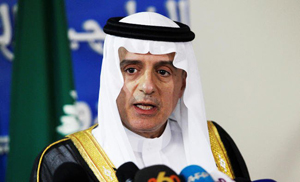Riyadh, May 15: Saudi Foreign Minister Adel Al-Jubeir and Riyad Hijab, chairman of the High Commission for Syrian Negotiations, discussed the six-year-old war in Syria here Saturday in a renewed bid to push for a solution.
 The meeting comes days before Syria peace talks that will be reconvened in Geneva on Tuesday, and before the visit of US President Donald Trump to the region, including Saudi Arabia, next week.
The meeting comes days before Syria peace talks that will be reconvened in Geneva on Tuesday, and before the visit of US President Donald Trump to the region, including Saudi Arabia, next week.
“Al-Jubeir and Hijab discussed the latest developments with regard to the Syrian conflict and the international efforts to solve the crisis,” the Saudi Press Agency (SPA) reported Sunday. “They also reviewed issues of mutual interest.”
It is “not clear” yet whether Al-Jubeir or his representative will attend the Geneva talks, said Foreign Ministry spokesman Osama Nugali.





Comments
Add new comment